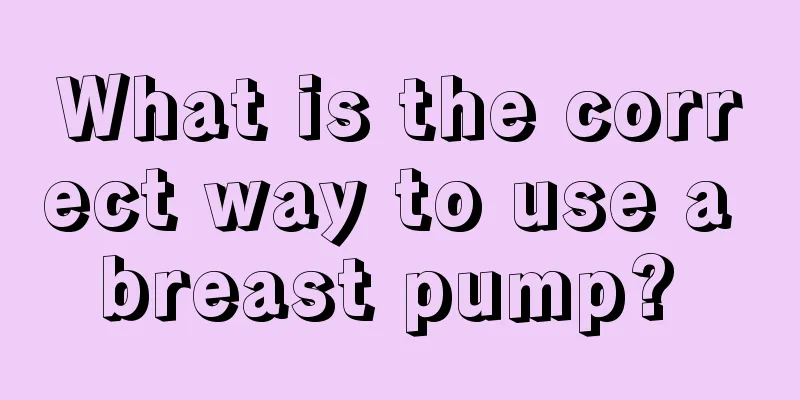What is the correct way to use a breast pump?

|
Everyone knows that a breast pump is a product that can be used to suck out milk from a woman's breasts and then use the milk to feed the baby. Especially for young women who have to go to work, breast pumps can be of great help. However, there are many things to pay attention to when using a breast pump. First of all, you can massage the breasts, which is conducive to the secretion of milk, otherwise it may not be sucked out. In addition, some breast pumps are now electric, so it is important to adjust the strength and never hurt the nipples. In short, different types of breast pumps require different methods of use. The correct technique must be mastered during use. Young women must learn the following steps and techniques. Step 1: Clean your breasts and hands Before using a breast pump, new mothers need to wash their hands and breasts to ensure that their hands and breasts are clean to avoid sucking in bacteria during the milk pumping process. After cleaning, squeeze out a small amount of milk from each breast. This is to ensure that the mammary glands are not blocked before proceeding with milk pumping. Step 2: Clean and disinfect the breast pump Before using a breast pump, the cleanliness of the breast pump must be ensured. You can clean and sterilize the breast pump, either with boiling water or with a professional sterilizer. After cleaning and sterilizing, install the breast pump and prepare it. Step 3: Relax your body When the body is relaxed and comfortable, milk is easier to secrete. Moms who use a breast pump must ensure that their bodies are relaxed. They can choose a comfortable place, lean forward slightly, put a soft pillow behind their backs, and prepare to start pumping milk. You can also place a cup of water next to you for backup. Step 4: Place the breast pump pad close to your breast Next, mothers need to press the breast pump funnel and massage pad tightly against the breasts, trying to make them stick together without any gaps. This will prevent air from entering the breast pump, which will cause the breast pump to lose suction and result in the embarrassment of not being able to suck out milk at all. How to use a breast pump correctly How to use a breast pump correctly How to use a breast pump correctly Step 5: Press the handle to suck milk After the massage pad is pressed tightly against the breast, mothers can gently press the handle of the breast pump to express milk. Press the handle four or five times quickly, and then stay for two or three seconds. The force should not be too strong, so that the milk can be sucked out smoothly and the process of sucking milk makes you comfortable. Step 6: Store the expressed breast milk After using a breast pump to extract milk, mothers can pour the milk into a clean bottle to feed their babies. This is more suitable for mothers with cracked nipples. It allows the nipples to fully recover while ensuring that the baby has enough breast milk. Moms can also store the expressed breast milk, put it in a breast milk storage bag, and freeze it. This is more suitable for working moms who breastfeed. Air should be prevented from entering during storage to avoid bloating and indigestion when the baby feeds again. |
<<: What is the correct way to measure blood pressure?
>>: What are the correct steps for applying a facial mask?
Recommend
Is art gouache paint poisonous
Gouache may not be particularly familiar to us. T...
What are the harms of dentures to the body
Once teeth appear, they will affect our normal di...
Why do lung cancer patients develop radiation pneumonitis? A complication
The reason why radiation pneumonitis is more like...
Symptoms of recurrence of bile duct cancer after surgery? There are 4 symptoms
Cholangiocarcinoma is a highly malignant tumor, a...
What are the specific measures to prevent thyroid cancer
What are the specific measures to prevent thyroid...
Pay attention to your daily diet and get rid of melanoma as soon as possible
The treatment of melanoma is a long process. Outs...
What are the main dangers of prostate cancer
Prostate cancer is a common malignant tumor in ou...
What is the reason for a rash on my face due to the hot weather?
In the hot summer, as the temperature rises, the ...
What is the most effective way to remove stains?
It is normal to have stains on clothes in life, b...
Is sex cord-stromal cell tumor cancer? Four types of sex cord-stromal cell tumors may become cancerous
Sex cord stromal tumor is a potential malignant t...
Explore the clinical manifestations of pancreatic cancer
There are many factors in life that can easily le...
What should liver cancer patients pay attention to during chemotherapy? How is the effect of traditional Chinese medicine treatment of liver cancer?
What should liver cancer patients pay attention t...
Can pumpkin and cantaloupe be eaten together
Although both pumpkin and cantaloupe are called m...
Six key points in osteosarcoma dietary taboos
Regarding the dietary taboos for osteosarcoma pat...
What are the benefits of soaking your feet in salt water
Soaking your feet in salt water can kill bacteria...









